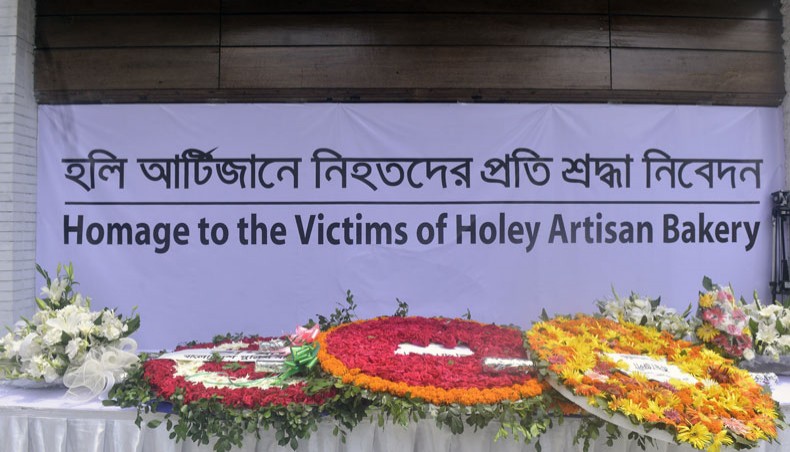Homage paid to Holey Artisan victims in Bangladesh
With a bouquet of flowers, Md Anisuzzaman travelled from Mawna in Gazipur on a bus and reached the dead-end of road 79 at Gulshan in Dhaka, where the two-storey Holey Artisan Bakery is located.
Passing through police frisking and archway, Anisuzzman lit a dozen of candles in the windy weather and remained silent for a few minutes.
He kept the bouquet at the entrance of the bakery where a table wrapped with white clothes was arrangement for placing wreathes to commemorate the victims of the deadly extremist attack on the premises two years back.
Anisuzzaman did not lose any of his family members but his 52-year-old employer, Nadia Benedetti, founder managing director of Valmont Sweaters Limited and StudioTex Limited.
Nadia was one of the nine Italian nationals slain in the extremist attack on Holey Artisan Bakery.
Nadia hired Anisuzzaman as a human resources manager in 2012 and taught
him how a supervisor manages any sort of problem in case of an emergency.
‘I spoke to her for the last time on June 15... and got the news of her death on July 2,’ Anisuzzaman narrated.
He left Valmont Sweaters Limited earlier this year but could not forget memories of his boss who used to be roving between European countries and Bangladesh.

The family of police officer Salahuddin Khan pays tribute to him and detective branch assistant commissioner Robiul Islam, who laid their life during a drive against extremists in Holey Artisan Bakery restaurant two years ago, by placing a wreath at statue Dipta Shapath following its inception in front of Gulshan Old Police Station in Dhaka on Sunday; while diplomats and foreigners walk to Holey Artisan Bakery restaurant at Gulshan on Sunday to pay homage to the victims of an extremists’ attack on the restaurant on its second anniversary. — Sourav Lasker
Like Anisuzzaman, many people irrespective of class, religion and political ideologies visited the Holey Artisan Bakery premises on Sunday amid tight security on the second anniversary of the deadly attack to commemorate the victims and vowed to resist extremism in the country.
Yawer Sayeed, who runs a firm called AIMS of Bangladesh Limited, was among the visitors.
He knew three of the five attackers and three of the 24 victims who were found either slit throat, chopped or bullet riddled.
‘The incident left a profound impact on me and opened avenues of soul-searching. One of my friends, also a neighbour, headed for the bakery after Iftar on that evening and asked me to accompany him but I declined as I was too tired. He could not reach that street as by that time the incident started,’ Yawer recalled.
The main gate of the bakery was kept open and additional police were deployed on and around road 79.
Most of the foreigners and many Bangladeshis avoided making any comments on their visit to the bakery premises. Most of them placed wreathes, waited for a moment and then left the place.
‘In having memory to those taken too soon,’ read one of the flower bouquets placed by Chenoa and Fahim Chawdhury. Chenoa was seen wiping tears and leaving the premises quickly.
Maksuda Begum, a vendor of cakes at Siddhirganj in Narayanganj, said that her 18-year-old son Md Jakir Hossain Shaon was an assistant chef at the upscale café and initially survived the attack.
Maksuda was seen wailing near the café premises.
Representatives of Japanese and Italian embassies and Australian high commission, Rapid Action Battalion director general Benazir Ahmed and Dhaka Metropolitan Police commissioner Asaduzzaman Mia paid tributes at different times.
‘We have nothing to be complacent,’ said Benazir who led the force to fight against extremists at the initial stage on that evening.
He reiterated that there would be no space for extremists in Bangladesh as he vowed that the fight against extremists would continue.
Talking to media, Awami League general secretary Obaidul Quader, who was leading a delegation of his party, said, ‘Terrorism is a global phenomenon... and no big incident took place afterwards.’ He said that the government remained alert and ‘we need to unite our people’.
Bangladesh Nationalist Party’s vice-chairman Ruhul Alam Chowdhury, a retired major general, led a small delegation of his party and expressed his disappointment over delayed investigation.
He said that the security forces could have started operation much earlier that night and could have saved more people.
The DMP commissioner, Asaduzzaman, later inaugurated a sculpture named Dipto Sopoth built on the Old Gulshan police station premises, located about one kilometre away from Holey Artisan Bakery.
The DMP chief recalled the supreme sacrifices of the then detective branch senior assistant commissioner Rabiul Islam and the then Banani police station officer-in-charge Salauddin Khan.
The sculpture, Dipto Sopoth, resembles Rabiul and Salauddin.
Inaugurating the sculpture, Asaduzzaman said that the charge-sheet in the case would be submitted this week.
Asked why the sculpture was built so far away from the original incident place, the DMP chief said that they had approached the owner of the land but could not get the land there. ‘So we decided to build it here on our own property so that future generations could learn about the supreme sacrifices of the police in countering extremists.’
The Gulshan café attack left 29 people, including 17 foreigners, two police officers and five suspects, killed.
Extremist group Islamic State claimed responsibility for the attack although the Bangladesh government claimed a faction of banned extremist group Jamaatul Mujahidin Bangladesh was responsible for it.
News Courtesy: www.newagebd.net











